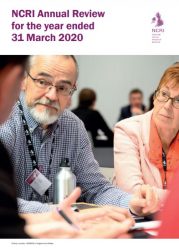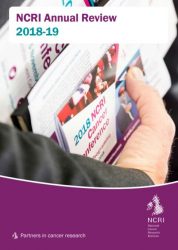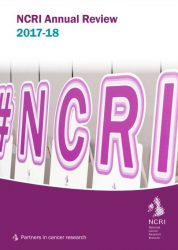In a year dominated by the COVID-19 pandemic, NCRI has continued to have an impact on the advancement of cancer research as well as in the new research area of COVID-19 and cancer.


“NCRI has not only adapted to challenging conditions to continue to advance cancer research but has welcomed the new circumstances using them to its advantage to progress as an organisation.”
Baroness Delyth Morgan
Chair, NCRI

“The pandemic brought many challenges to the cancer research community. NCRI was able to identify the impact on research funding, something only possible due to the collection of cancer research funding data from NCRI Partners.”
Dr Iain Frame
CEO, NCRI
The COVID-19 pandemic continues to highlight the critical role of research and collaboration to tackle health crises effectively. NCRI's position has allowed it to provide oversight and support the rapidly emerging research area of COVID-19 and cancer.

One of NCRI’s strategic strengths is our ability to bring together cancer research funders from the UK and worldwide to work together to advance cancer research. We use cross-sector knowledge to support the development of organisations’ research strategies and influence research practices on a global scale.





















At the core of NCRI’s activities is a focus on improving the quality and delivery of research to maximise patient benefit. NCRI Groups, including CMPath and CTRad, review and advise on research proposals and develop studies to address gaps in the research portfolio.
NCRI has identified a need to address critical academic attrition points during clinical training and researcher career pathways to ensure research remains a driver of better healthcare. NCRI is improving the training and retention of clinical academics and early career researchers, creating a research-ready workforce.
We involve patients, carers and others affected by cancer (also known as ‘Consumers’) in all of our work. Consumers have been involved in several key areas this year such as cancer and COVID-19 and health data and AI.
NCRI has identified four scientific priority areas that need to be addressed to deliver better outcomes for all those affected by cancer, health data and AI, immunology and immunotherapy, screening, prevention and early diagnosis and living with and beyond cancer.
To keep the community connected and provide an opportunity for researchers to share knowledge and foster collaboration, we decided to focus on a series of virtual sessions on topics of strategic importance.

Organisations including NCRI and its Partners have faced many challenges during the past 12 months. NCRI has embraced virtual working and utilised digital technology to make efficiencies in our ways of working.
The events of 2020 shed light on the inequalities that exist in society and in many organisations. At NCRI, we have looked at our existing practices and policies and educated ourselves on where we need to do better. We have formed an EDI working group and are currently developing an action plan focussing on areas where we can exert most influence.


